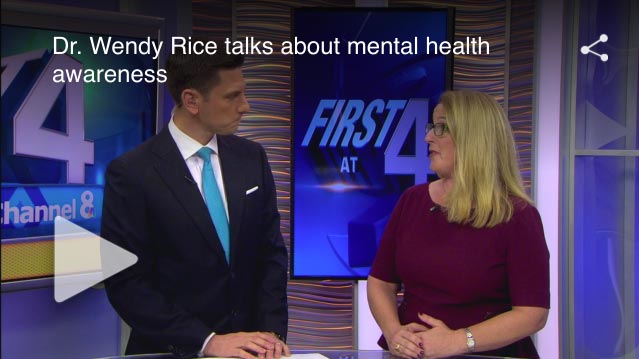By Wendy Rice, Psy.D. Licensed Psychologist
 I recently had the pleasure of appearing on television to talk about the stigma surrounding the topic of mental illness. The main issue is that, although mental illnesses are very common and can affect a significant portion of the population, a large segment of society continues to be very hush-hush about getting a diagnosis and/or treatment. The stigma is so overwhelming that the majority of people with mental illnesses are hesitant to even talk about it. So, if many people are experiencing some sort of mental illness, why the stigma? Are we stereotyping huge numbers of people?
I recently had the pleasure of appearing on television to talk about the stigma surrounding the topic of mental illness. The main issue is that, although mental illnesses are very common and can affect a significant portion of the population, a large segment of society continues to be very hush-hush about getting a diagnosis and/or treatment. The stigma is so overwhelming that the majority of people with mental illnesses are hesitant to even talk about it. So, if many people are experiencing some sort of mental illness, why the stigma? Are we stereotyping huge numbers of people?
The journey to feeling better may seem long and grueling, but don’t let the stigma get the better of you. The journey towards a better tomorrow begins today.
Understanding the Issue
The word stigma signifies a smudge of shame that sets a person apart from the rest. When an individual is categorized by a mental illness, they are placed at the heart of a stereotyped group. This negative categorization can often give way to negative attitudes that can potentially be accompanied by adverse actions and discrimination. While the stigma surrounding mental illnesses is widespread, the statistics (according to the National Institutes of Mental Health) regarding their regularity should be cause enough for change:
- More than 20% of children (1 in 5) are currently experiencing, or have experienced, a debilitating mental disorder at one point in their lifetime.
- About 2.6 million adolescents aged 12-17 (10.7% of the population) experienced at least one major depressive incident in 2013.
- About 43.8 million adults (18.5% of the population) were diagnosed with a mental illness in 2013 alone. This is in direct contrast to the people diagnosed with diabetes (12% of the population) and asthma (18% of the population).
My Take
 When someone visits their doctor with complaints that sound like diabetes, they are evaluated and tested to figure out the appropriate diagnoses. If it’s diabetes, their doctor creates an optimal treatment plan that may include a combination of lifestyle changes and medication or insulin. Why is it that when someone is experiencing trouble getting out of bed or functioning at school or work, we don’t follow a similar path?
When someone visits their doctor with complaints that sound like diabetes, they are evaluated and tested to figure out the appropriate diagnoses. If it’s diabetes, their doctor creates an optimal treatment plan that may include a combination of lifestyle changes and medication or insulin. Why is it that when someone is experiencing trouble getting out of bed or functioning at school or work, we don’t follow a similar path?
I think part of the problem is that we generally cannot “see” mental illnesses with an MRI machine, the naked eye or under a microscope. This leads many people to believe it is not real and is instead a character defect or moral failing. The reality is most mental illnesses are “brain-based” and many are highly treatable. On the other hand, many think that folks with mental illness are dangerous or brought their problems onto themselves. Interestingly enough, however, there is a stigma that comes from others and a stigma that is self-imposed.
Additionally, I think that if a person has never (knowingly) experienced symptoms of a mental illness, they may find it very hard to relate and show empathy. For example, if a person gets food poisoning and a terribly upset stomach, they may find it easier to relate to someone with Inflammatory Bowel Disease than if they had never experienced severe abdominal symptoms.
At Rice Psychology Group, when we are able to give family members a peek into what it is like to live inside the mind of their loved one and understand how he/she sees the world, sometimes there is greater empathy and understanding. This means it’s essential for people to understand what mental illnesses and mental health are!
- A condition that affects a person’s thoughts, feelings or mood and has a negative impact on their ability to function properly and/or relate to others is known as a mental illness.
- A mental health condition usually occurs as a result of more than one event and has multiple causes. These causes may include genetics, the environment and a person’s lifestyle, along with traumatic life events such as being the victim of a crime and factors like a stressful job or home life.
Rice Psychology Group’s Role
Many people may be bothered or frightened about what they believe happens when dealing with a mental illness at Rice Psychology Group or any other therapy practice. However, the experience is not as mysterious as you may think! Know that we won’t try to dig for problems that aren’t there or lay you down on a couch to uncover your deepest and darkest secrets.
Our mission is to find an objective and informed understanding of what’s going on and how we can work together to help you deal with it. If a person suffers from a physical problem, physicians don’t just hand out random medicine. Instead, their doctor will try and determine the underlying cause and treat the problem accordingly.
When a child or adult is showing signs of emotional, behavioral or thinking problems, we owe them the same respectful treatment. But so many people are so afraid of finding out what is wrong. I would prefer to know that my child has an ADHD-type brain instead of having him or her go through life thinking that they are just a lazy, unmotivated, good-for-nothing person!
We’re Here to Help
At Rice Psychology Group, we utilize interviews, questionnaires and diagnostic tests to help us understand your issue. We talk, use humor, use insight, videos, books and even go for walks with our very own therapy dog! Our team really does whatever it takes to make a child or adult feel comfortable talking and dealing with what’s bothering them.
If you or someone you love has been feeling the emotional pressures of a possible mental illness, we can help. Feel free to watch my appearance at the NBC station where I talk about the issues concerning stigma, my Kids are Kids story and my very own experience with ADHD! If you have any questions about mental illnesses, don’t hesitate to contact us today.


